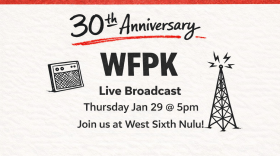Dave Wakeling doesn’t need a script. The English Beat frontman, one of ska’s great songwriters and an even better conversationalist, can take a conversation from the intricacies of tea blends to the collapse of Western civilization without ever losing the thread.
“I’ve been preparing my palate to start drinking fine Chinese teas,” Wakeling says. “But first, I bought about 20 of the finest tea bags from around the world—boxes, not singles—and I’m going through, building my top 10 British-style cuppas with milk.” He gives a thoughtful pause, then adds, “I’m also growing tea plants, but we’ll see if they survive California.”
Of course, this isn’t actually a tea podcast, but Wakeling’s ability to find joy in the details is part of what makes The English Beat’s reissues, released via Rhino, feel like something more than just another vinyl cash grab.
“They did a terrific job,” Wakeling says. “You can tell when a reissue is done by someone who was there the first time around versus someone who wasn’t. You hold these and they feel great. They sound better, too. Mastering technology now—someone told me you can make an album sound like Dark Side of the Moon at the push of a button. Not the actual Dark Side of the Moon, just the sonic field it exists in.”
One can only imagine a version of I Just Can’t Stop It calibrated to Pink Floyd’s specifications. But as much as The English Beat’s early music still resonates, Wakeling sometimes wishes it didn’t.
“Too many of them are still pertinent,” he says. “They were meant to be warnings. Watch out, kids, or this is going to happen. And now it’s happened. People come up after the shows and go, ‘Cor blimey, Dave, these songs could have been written today.’ I’m like, ‘Yeah, that was the fear.’”
That’s not to say he doesn’t see progress. “The fact that there are now more women in the world who can read and write than ever before—should that even need to be a statistic? No. But it is, and it’s moving in the right direction,” he says. “At the same time, you see the backlash. You see rights that had to be fought for being dragged into public debate, and it’s exhausting.”
He pauses, then cracks a grin. “At least it’s still catchy.”
That’s one of Wakeling’s gifts: delivering heavy messages in a way that makes people dance. “That was the idea,” he says. “Put on a party, raise a couple of issues, see if being happy is enough to save the world. And if not, at least we’ll have a good dance before we go.”
That philosophy hasn’t changed much, but his thoughts on recording have. After 2016’s Here We Go Love, he’s sitting on a dozen new songs—but for now, they’re just for him.
“I’m playing a game with myself,” he says. “Pretending these songs are only for me. I’ve hoed myself out quite enough. No one’s going to hear them except muggins here.” He smirks. “They’re also the 12 best songs I’ve ever written. Especially before I record them.”
This is, of course, a lie. The English Beat are touring, including some shows with Vampire Weekend. “A great honor,” Wakeling says, before admitting that his memory is so foggy he had to be told they’d never played the Hollywood Bowl before. “We had to shuffle a few things, but all the other acts we were scheduled with were like, ‘We’re not going to stand in the way of Dave playing the Bowl.’ That was lovely of them.”
As for those new songs?
“You’ve twisted my arm,” he laughs. “Fine, I’ll share them.”
Maybe.
Watch the interview above and then check out the video below.






